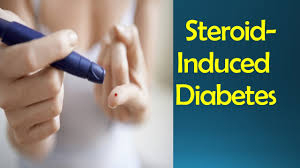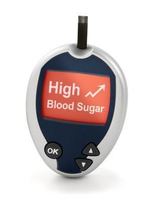Cancer and Diabetes
Daffodil Month, held every April, is a national fundraising campaign of the Canadian Cancer Society. This campaign is to raise awareness and to raise money to help fund cancer research. It has been well documented that there is an increased risk of certain cancers in people who also have diabetes. Until very recently, the exact cause has not been known, but new research is beginning to shed light on this process and it appears as though high blood sugar levels may be responsible for damaging DNA and preventing the repair of that DNA in our bodies. This damage to our cells increases our risk of cancer (ovarian, kidney, breast, and others). Try and keep your blood sugars as close to normal as possible to reduce your risk. This may require changes or additions to your medications if you are struggling to achieve targets. Connect with your health care team to review options.
|

|
 Steroid-Induced Diabetes
Chemotherapy is a common treatment for people with cancer. Steroids are often given with chemotherapy to lessen nausea and decrease inflammation, but they do raise blood sugar levels. Steroid-Induced Diabetes can be diagnosed if blood sugar levels rise above normal during this treatment. Click here for an informational pamphlet.
Symptoms of having Steroid-Induced Diabetes can be similar to uncontrolled type 1 or type 2 diabetes:
|
| |
- Unusual thirst
- Frequent urination
- Weight loss despite an increase in appetite
- Blurred vision
- Nausea and vomiting
- Extreme weakness and fatigue
|
- Irritability and mood changes
- Frequent bladder and skin infections that don't heal easily
- High levels of sugar in the blood when tested
- High levels of sugar in the urine when tested
- Dry, itchy skin
|
Treatment for Steroid-Induced Diabetes includes diabetes education; dietary management, glucose monitoring and medication as prescribed. A referral to a diabetes education program and an endocrinologist for consult is recommended. In people who did not have diabetes or high blood sugars before starting steroid treatment, blood sugar levels usually return to normal once they are stopped. Click here for a link to the self-referral form for diabetes education.
|
 |
Pre-Existing Diabetes and Cancer
People with pre-existing diabetes that are now being treated for cancer, may have difficulty controlling their blood sugar levels. Diabetes treatments often need to be adjusted to help get blood sugar levels under control. For those with type 2 diabetes, insulin is often used, and is usually started around the time that steroids are given. Other aspects of treatment include diabetes education and a referral to an endocrinologist for consult, as medication and insulin may need to be frequently adjusted during treatment.
Although diabetes is sometimes not the primary concern for those dealing with cancer, keeping blood sugar levels within a reasonable range can make you feel better, by preventing the symptoms of high blood sugar levels, and can also reduce risks of infection, and prevent delays in cancer treatment.
|
|
|
|
|